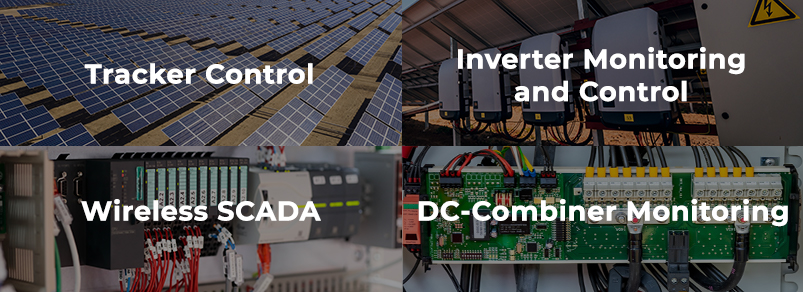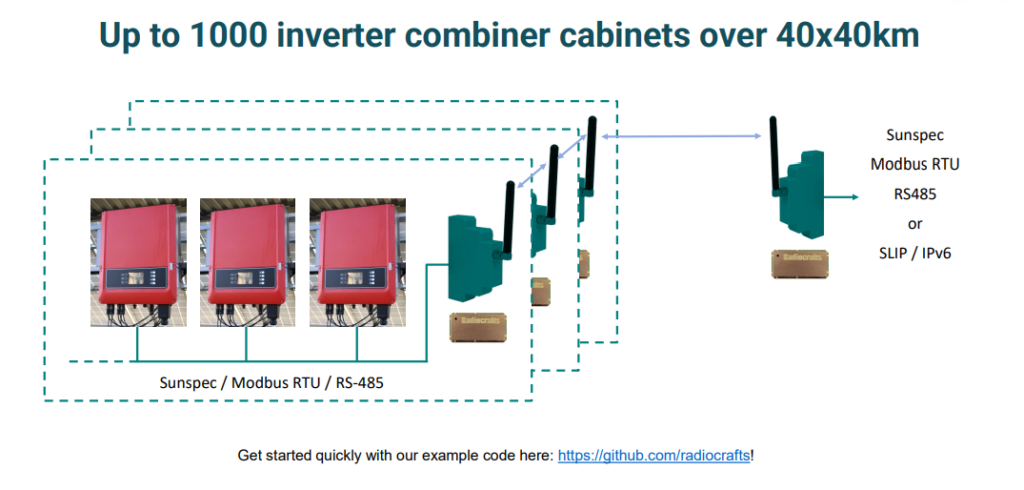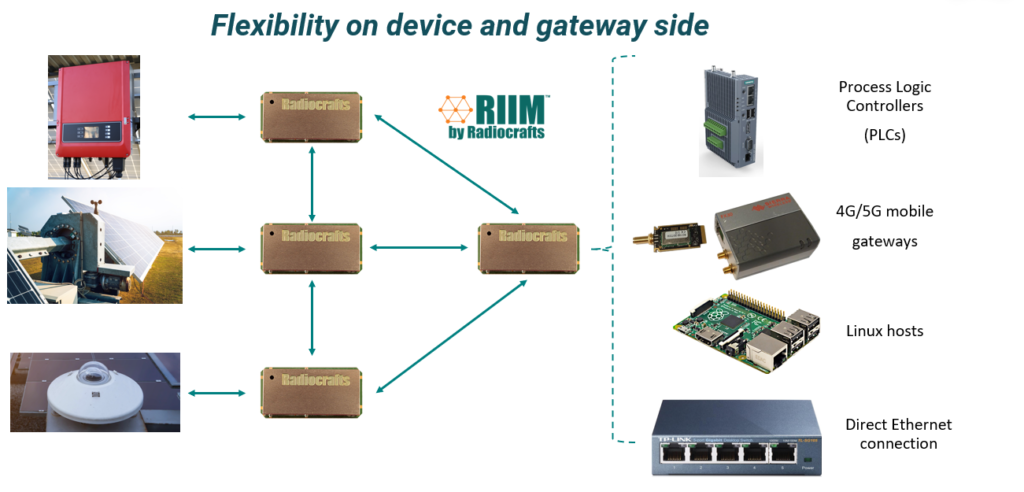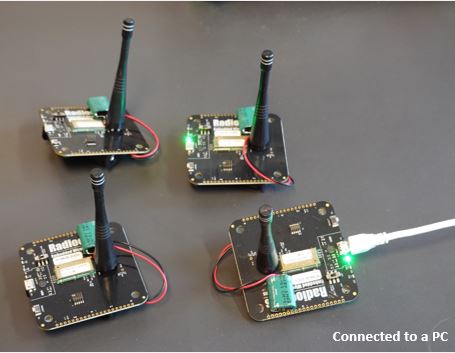Learn more about our Sub-GHz mesh networking solution, RIIM, optimized for reliable and scalable Solar Networks! Schedule a Teams Meeting with Radiocrafts or leave a message on our contact form!

The Radiocrafts Industrial IP Mesh (RIIM) solution is an optimal technology for solar installations that require an ultra-reliable and scalable network supporting low latency, high data throughput, and simplified commissioning for quick rollouts and simple scaling. A solution capable of covering an entire utility-scale solar facility or rooftop solar system on a single gateway with up to 1000 devices.

Unmatched reliability in data transmission success rates

Up to 1000 devices over a 40 x 40 km squared area

Available as both module and FW license for chip design

Optimal for utility-scale solar facility control and rooftop installations

Superior range and penetration in concrete and steel structures

Network partitioning and simplified commissioning for quick rollouts and simple scaling
Radiocrafts’ Solution For Solar Networks – RIIM

The RIIM module is a wireless communication network that is easy-to-use and completely embedded within the module. It includes all the essential components for a complete wireless network and doesn’t require any license fees or subscription costs. Furthermore, RIIM is a mesh network, meaning it is self-forming, self-healing, and self-optimizing. As a result, network partitioning and commissioning are effortless as they happen automatically. In other words, the plug-and-play process simplifies Solar network deployments significantly.
In addition, Sunspec/Modbus RTU wireless inverter monitoring is very easy to implement out-of-the-box using our example code on GitHub.
Modbus is frequently used for interfacing with inverters and other devices. That being said, RIIM supports quick Modbus integration based on readily available example code as mentioned above. Find more information in our application note below as well.

Exceptional Long Range and Scalability
RIIM enabled devices can communicate with each other within a range of 1.5km. In addition, a RIIM data packet can hop up to 28 times from device to device across the network. This allows the network to cover a utility-scale solar facility as large as 40×40 kilometres squared, or 25×25 miles squared.
Equally important, in urban environments, RIIM can cover a building complex or campus as large as 5.6 square kilometres long (3.5 miles) with up to 150 meters between each device inside a building with reinforced concrete.
Moreover, RIIM operates on the 868/915 MHz frequency bands providing better range compared to solutions using the 2.4 GHz band.
RIIM’s long range and coverage, combined with the ability to connect up to 1000 devices to a single border router (gateway), make it a highly scalable network. This creates flexibility in terms of border router placements and significantly reduces installation costs. Consequently, only one gateway is needed to support a large-scale deployment in a utility-scale solar facility, or building complex. To cover a larger area, another border router can be added.
For more information on RIIM’s range test results, including tests conducted inside our building complex, please refer to the application notes provided below.

Unmatched Reliability and High Data Throughput
RIIM’s supported Time-Synchronized Channel Hopping and Adaptive Frequency Agility features provide unmatched reliability in data transmission success rates for Solar networks.
Time Synchronized Channel Hopping (TSCH) works by re-sending a data packet that was lost between two devices on a different channel in the next available time slot. Therefore, it is a channel hopping mode designed to make a mesh network with less packet collisions and higher reliability. A TSCH network has a proven reliability rate of up to 99.99%.
Adaptive Frequency Agility (AFA) works by scanning and marking all channels that are often found to be noisy, dropping them from the frequency hopping list. This ensures that the radio only transmits data using the best channels with the least noise, providing high data throughput networking and low latency with minimal packet loss.
In addition, AFA increases the allowed duty-cycle in Europe to 40%, making frequent tracker communication possible while supporting the vast amounts of data communication required by a Solar network.
The reliability factor offered by combining TSCH and AFA are essential for Solar networks located in buildings with reinforced concrete and where high levels of interference from other radio solutions are present. RIIM simplifies radio coverage planning with good penetration in building materials and long-range between devices enabling network operation in several building complexes from a single gateway, and allows for indoor gateway deployment.
For applications that require higher data capacity, RIIM offers a 150kbps mode. This is particularly useful for inverter communication and control, where low latency is critical. Using dedicated timeslots, RIIM can offer predictable and low latency to support inverter control as well.
Learn more about TSCH and Adaptive Frequency Agility in the application notes and demos below.

Efficient Local Control and Maintenance of Devices
RIIM provides efficient local control and maintenance of devices through mist computing and two-way communication, enabling Over-The-Air updates as well.
This means that you can update the device firmware when the network is deployed and in full operation. New sensors/controllers can be added when the need arises, and you can broadcast messages of new schedules efficiently. These features are especially important for solar installations where many devices are located in hard-to-reach areas and need to be in operation for extended periods of time. Touchless firmware updates are critical for ensuring efficient maintenance and operation.

Quick and Easy Cloud Connectivity
RIIM is also designed to have direct cloud connection using protocols such as IPv6, UDP, CoAP and DTLS, providing immense flexibility on the gateway side. This offers direct end-to-end IP packet communication with end-to-end security. Furthermore, RIIM can operate in a local mode where no internet connection is used.
Another case is to extend RIIM with an edge gateway serving as a network entry-point for devices talking to cloud services. An external cloud connection can be established from the gateway device. This is useful for implementing edge-computational functions to reduce latency or when the connection to the cloud is lost. In addition, the gateway does not need to be a specific IoT gateway. It can actually be a PLC (Programmable Logic Controller), a Raspberry Pi (or any Linux host), or a computer.
Please find our application note below to learn more about connecting RIIM with an edge gateway.
Additionally, Radiocrafts’ GitHub page provides sample code on how to connect RIIM to an edge computer.
Next-Gen Solar Evaluation Kit!
Radiocrafts has developed a Next-Gen Solar Evaluation Kit for you who wants to test the RIIM network for your solar installation project.
The Evaluation Kit Comes With:
- 4 Development Boards with RIIM Mesh modules
- 1 Mesh Router – Gateway connected to the power plant controller / datalogger
- 3 Mesh Routers – Devices in the utility-scale solar field or building rooftop. Ex: Solar trackers, electricity meters, DC combiners, inverters, irrometers.
- 4 AA Battery Holders
- 4 antennas
- 1 USB Cable

Radiocrafts visited one of our solar tracker customers to assist in commissioning their large scale installation using RIIM mesh.
Learn more about the Evaluation Kit and the results from the large scale installation we ran in the short video below or on our dedicated Solar Evaluation Kit landing page.
RIIM Support Tools
We highly recommend that you get a RIIM Development Kit in your early-stage product evaluation. The Development Kits are designed to be easy-to-use and to very quickly support a wireless network where you can make a good analysis of the network performance and build your PoC, prototype, or MVP.
RIIM is supported in most countries in the world. Explore the possibilities of using RIIM in your country in the application note below!
You can buy the RIIM Development kit from:
- Digi-Key
- Or from a distribution partner in your country.
Read more about the RIIM Network here.
Learn about the different RIIM Parts and Tools here.
Read our extensive documentation on RIIM, including datasheets, User Manuals, Development Kit documentation, Application Notes and more, here.
Download Software Tools for RIIM here.
Watch tutorial videos on how to use the RIIM Development Kit here.
Learn more about our Sub-GHz mesh networking solution, RIIM, optimized for reliable and scalable Solar Networks! Schedule a Teams Meeting with Radiocrafts or leave a message on our contact form!
